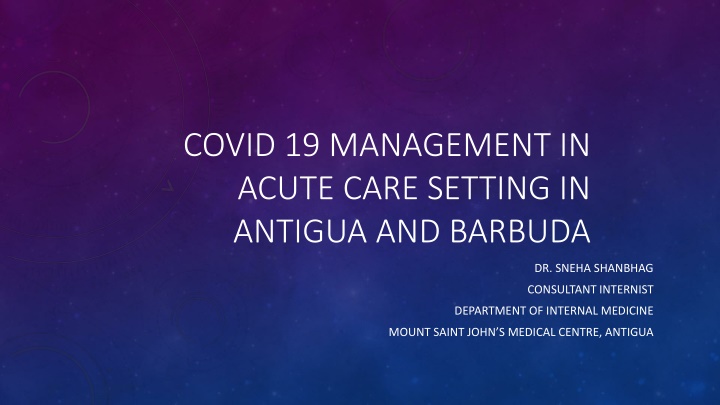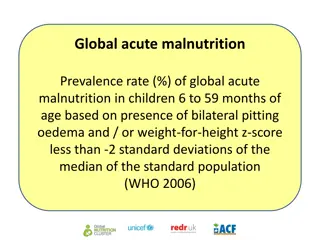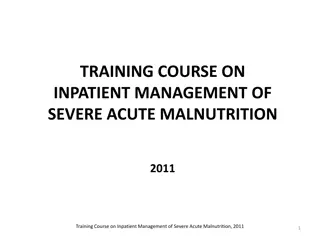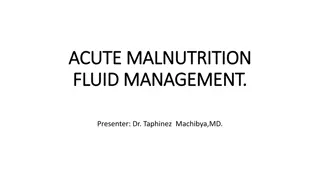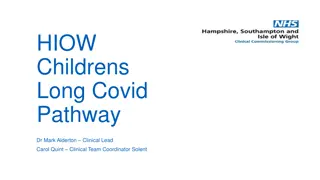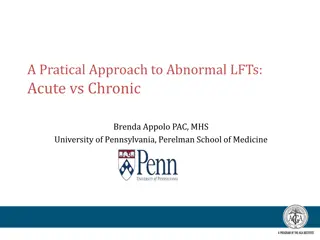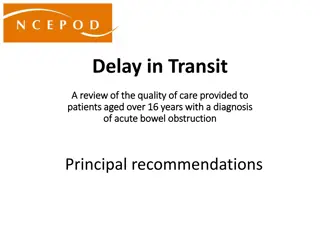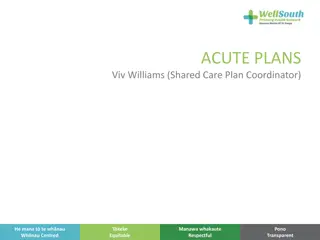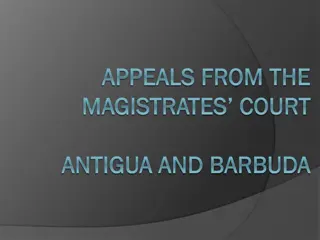Management of COVID-19 in Acute Care Setting in Antigua and Barbuda by Dr. Sneha Shanbhag
This presentation by Dr. Sneha Shanbhag, a consultant internist at Mount Saint John's Medical Centre in Antigua, outlines the COVID-19 management strategies in the acute care setting. The presentation covers case severity breakdown, hospital admission guidelines, therapeutic management for mild to severe cases, recovery rates, and length of stay. It includes insights on factors leading to severe disease, admission criteria to different units, discharge guidelines, and therapeutic interventions based on disease severity. Challenges like bed availability and remdesivir supply are also highlighted.
Download Presentation

Please find below an Image/Link to download the presentation.
The content on the website is provided AS IS for your information and personal use only. It may not be sold, licensed, or shared on other websites without obtaining consent from the author.If you encounter any issues during the download, it is possible that the publisher has removed the file from their server.
You are allowed to download the files provided on this website for personal or commercial use, subject to the condition that they are used lawfully. All files are the property of their respective owners.
The content on the website is provided AS IS for your information and personal use only. It may not be sold, licensed, or shared on other websites without obtaining consent from the author.
E N D
Presentation Transcript
COVID 19 MANAGEMENT IN ACUTE CARE SETTING IN ANTIGUA AND BARBUDA DR. SNEHA SHANBHAG CONSULTANT INTERNIST DEPARTMENT OF INTERNAL MEDICINE MOUNT SAINT JOHN S MEDICAL CENTRE, ANTIGUA
SCHEME OF PRESENTATION Breakdown of cases on severity Hospital admission guidelines Management of moderate to severe cases Recovery rates and length of stay
BREAKDOWN OF CASES AS PER SEVERITY Total cases :1007 Hospitalised cases: 160 Mild to moderate disease: 100 Severe disease: 60 Total deaths: 27 Factors for severe disease: age, co morbidities (diabetes, hypertension, chronic lung disease, dementia, CKD, obesity, smoking)
HOSPITAL ADMISSION AND DISCHARGE GUIDELINES Admission to ward :1. Tested positive for covid 19, assessed to have moderate to severe 2. Mild disease with co morbidities 3. Mild disease who cannot self isolate Admission to ICU: 1. Tested positive for Covid19 with critical illness 2. Tested positive for covid with mild/moderate illness with rapid detoriation Shift to IDC : 1. Mild cases who have not worsened 2. Moderate / severe cases who have improved clinically Discharge : 1. Clinically improved case with a negative swab test 2. Clinically improved case who is asymptomatic but still tests positive who can self isolate Challenges: number of beds , nursing staff
THERAPEUTIC MANAGEMENT OF COVID19 : MILD/MODERATE/SEVERE DISEASE NIH Guidelines Mild/ Moderate disease: Ivermectin, Multivitamins (vitamin C and Vitamin D) , Zinc, Antibiotics (case based), colchicine, Paracetamol. Management of comorbidities as per individual case. Severe disease: Supplemental O2 therapy, Dexamethasone(12mg iv stat followed by 6mg iv per day for 10 days) plus Remdesivir (200mg iv stat followed by 100mg iv OD per day for 5 days) Challenges : Remdesivir supply is limited. Used only in those cases who require more than 5litres of O2 for more than 2 days. DKA cases were not given Dexamethasone
THERAPEUTIC MANAGEMENT OF COVID 19 IN ICU Non invasive ventilation (CPAP) : Dexamethasone plus remdesivir Invasive mechanical ventilation: Dexamethasone plus remdesivir Other considerations: 1. Infection control: N95 masks plus PPE, avoiding aerosol generating procedures, Intubation by intensivists only 2. Hemodynamics: fluid resuscitation, Nor epinephrine for shock, Dobutamine for Cardiogenic shock 3. Oxygenation and ventilation: NIPPV, no awake proning, Endotracheal intubation ( low tidal volume, conservative fluid strategy, prone ventilation 12 to 16 hours, High PEEP)
4. Acute kidney injury and Renal Replacement Therapy: Intermittent hemodialysis 5.Antimicrobial therapy: Broad spectrum antibiotics, case based approach 6. Anti thrombotic therapy: full dose anticoagulation : LMWH 7. Immunomodulators: Tocilizumab 8. Pregnant women: Challenges: HFNO, CRRT, ECMO, Tocilizumab not available
RECOVERY RATES AND LENGTH OF STAY Mild to moderate cases : recovered with supportive care. 10 cases progressed and 1 died Severe cases : 50 % cases improved Critical cases : 25 cases were treated with CPAP: 22 improved and were successfully weaned Mechanically ventilated cases: 2 improved Length of stay: Mild to moderate cases : 10 to 14 days Severe cases : 14 to 21 days critical cases: CPAP: 1 month Invasive ventilation: 1 month to 4 months
INTERESTING CASES Case 1: 32 year old male, juvenile diabetic, assessed to have critical illness, intubated and mechanically ventilated from day 1. remained on the ventilator for 2 months, tested negative for covid, tracheostomy done, patient recovered and was discharged home on Day 90. He continues to have balance issues and still needs physiotherapy for his post covid sequelae. Case 2: 73 year old male, DM, HTN, hypoxemic respi failure with SPO2 of 70% on room air on presentation. Intubated and mechanically ventilated from day 1 to day 90. He had 3 cardiac arrests, Multiple infections (CAUTI , Acenitobacter Pneumonia), bilateral pleural effusions, ICU delirium. Tracheostomy done on day 80. Patient was successfully weaned from ventilator and was discharged home. Patient has developed mild renal dysfunction as a part of covid sequelae.
